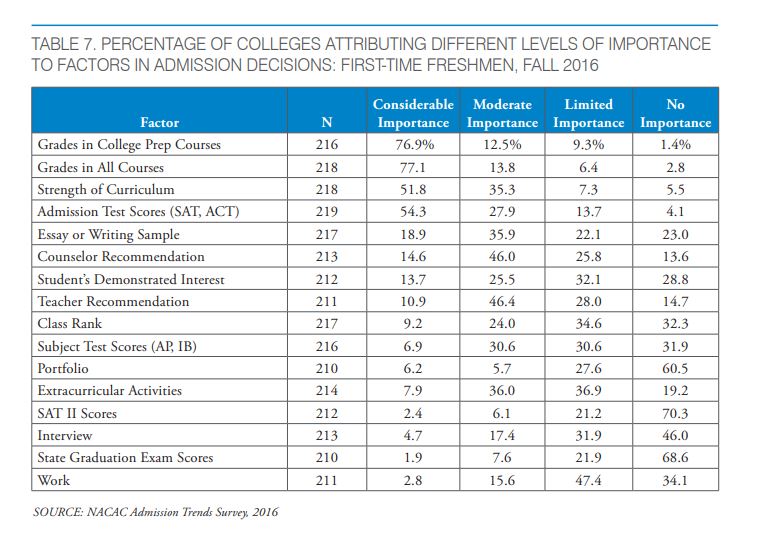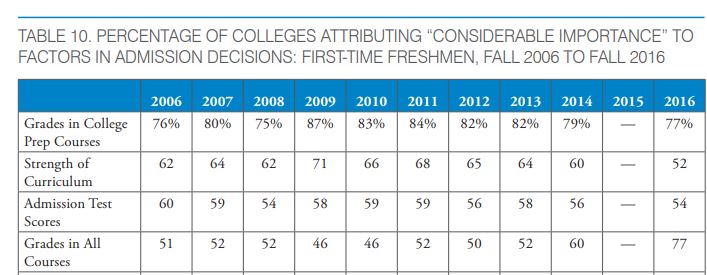College Admissions Tips and Guidance
Results From College Survey on Admission Decision Factors

Explore Our Articles
Recent Posts
Popular Categories
Get In Touch
On Social
By Phone or Text
(617) 734-3700
By Mail or Email
1678 Beacon Street
Brookline, MA 02445
By Form
Educational Advocates
Our objective is to guide the family in finding options where the student will not only get admitted, but thrive and find success once on campus.
Results From College Survey on Admission Decision Factors
The National Association for College Admission Counseling (NACAC) surveys college admissions counselors to determine the weight of various criteria in college application decisions. NACAC’s 2017 State of College Admission Report is based on data from 603 institutions representing a wide variety of colleges.

Table 7 shows us that 77% of colleges surveyed identified grades in high school college preparatory courses and grades in general as the most significant factors in their admissions decisions. Strength of curriculum as evidenced by rigorous course choices and SAT or ACT scores are the next most important with just over half of reporting colleges giving these factors considerable importance. High school grades rank highest because colleges have found a strong correlation between students’ academic performance in high school and their academic performance in college as well as with college retention and graduation rates.
So what exactly does this data mean in terms of your high school experience? Colleges want you to get good grades. Additionally, just over 50% of the colleges surveyed also want you to challenge yourself. Highly selective colleges with acceptance rates of less than 30 percent encourage you to take the most rigorous courses available in your curriculum. The Yale University website confirms this: “When the admissions committee looks at your transcript, it will not focus on whether you have taken any specific course. It will be far more interested to see that you have challenged yourself with difficult coursework, and have done well.” However, there are some colleges that do like to see specific courses such as calculus for prospective business or engineering majors.
Colleges such as Syracuse University that admit about 50 percent of applicants want students to participate in honors and AP classes but may not expect students to take every advanced class possible as indicated in this statement of what they seek in applicants: “Your participation in honors and advanced placement courses and/or meaningful electives demonstrates your commitment to maximize your college experience.”
Overall, most four-year colleges encourage students to focus on major (college prep) courses: English, math, science, history and foreign language for all four years of high school.
Colleges also pay attention to trends in grades. Certainly, an upward trend is preferable to a downward one. Many admissions officers are mindful of the fact that freshman year is a time of transition and explicitly state that freshman year grades are less important. Even the most selective college in the country, Stanford University, states on its website: “We will focus our evaluation on your coursework and performance in 10th, 11th and 12th grades, primarily in the core academic subjects of English, mathematics, science, foreign language and history/social studies.”
 Table 10 reveals that while performance in college preparatory classes has consistently placed as the top factor in college admissions decisions, in 2016 grades in all high school courses ranked equally important for the first time ever. This means that more colleges are paying attention to your overall GPA including performance in elective classes than they did in the past. This is good news because typically the electives you choose are based on your strengths and interests so you are likely to perform well in those classes. So if you are trying to decide how many honors or AP level classes to take, keep in mind that this year’s data indicates that some colleges would rather see you get an “A” in a standard or honors class than a “B” in the honors or Advanced Placement version. It depends on the college so be sure to discuss your options with your consultant.
Table 10 reveals that while performance in college preparatory classes has consistently placed as the top factor in college admissions decisions, in 2016 grades in all high school courses ranked equally important for the first time ever. This means that more colleges are paying attention to your overall GPA including performance in elective classes than they did in the past. This is good news because typically the electives you choose are based on your strengths and interests so you are likely to perform well in those classes. So if you are trying to decide how many honors or AP level classes to take, keep in mind that this year’s data indicates that some colleges would rather see you get an “A” in a standard or honors class than a “B” in the honors or Advanced Placement version. It depends on the college so be sure to discuss your options with your consultant.
The scenario above is further supported by another shift in this year’s data. Table 10 illustrates that in past years, the second most important factor in admissions decisions has always been rigor of course work. This year emphasis on strength of curriculum has decreased to fourth place at 52% and SAT/ACT scores were seen as slightly (2%) more important by the schools that responded. It will be interesting to see whether or not those numbers remain constant next year.
The take away from NACAC’s 2017 report is to establish a plan for your high school course work and to develop effective study habits early on. Be aware of the courses offered at your high school and of the track you start on in ninth grade and where it can take you. For example, if taking calculus as a senior is a goal, be sure that you are choosing a freshman math class that sets you on the curriculum pathway leading to calculus. Since you know your grades matter, put effort into your classes all along. Meet with teachers when necessary, stay on top of your homework, and don’t wait until the last minute to prepare for tests, papers and projects.
Think about a college applicant as a cupcake. Your grades in high school and the strength of your curriculum (for colleges who value that) make up the cake portion of the cupcake. Your SAT or ACT scores are the frosting. All the rest: essays, recommendations, extracurricular activities, demonstrated interest, Subject, AP and IB test scores, and interviews, are the sprinkles. At selective colleges, admissions officers expect you to have delicious cake and frosting, so it’s your sprinkles that really help you stand out in the box of a dozen.
The college admissions process is complicated and requires thoughtful planning from the very beginning of high school. We are happy to offer guidance along the way!








